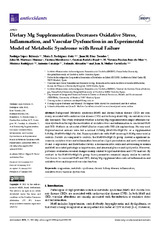Dietary Mg Supplementation Decreases Oxidative Stress, Inflammation, and Vascular Dysfunction in an Experimental Model of Metabolic Syndrome with Renal Failure
Autor
López-Baltanás, Rodrigo
Rodríguez-Ortiz, Maria E.
Díaz Tocados, Juan Manuel
Martínez-Moreno, Julio M.
Membrives, Cristina
Rodelo Haad, Cristian Roberto
Pendón-Ruiz de Mier, María V.
Pendón-Ruiz de Mier, María V.
Rodríguez, Mariano
Canalejo, Antonio
Almadén Peña, Yolanda
Muñoz-Castañeda, Juan R.
Editor
MDPIFecha
2023Materia
MagnesiumMetabolic syndrome
Chronic kidney disease
Inflammation
Oxidative stress
Vascular dysfunction
METS:
Mostrar el registro METSPREMIS:
Mostrar el registro PREMISMetadatos
Mostrar el registro completo del ítemResumen
whether a dietary Mg supplementation might attenuate vascular dysfunction through the modulation of oxidative stress and inflammation in concurrent MetS and CKD. Methods: A rat model of MetS (Zucker strain) with CKD (5/6 nephrectomy, Nx) was used. Nephrectomized animals were fed a normal 0.1%Mg (MetS+Nx+Mg0.1%) or a supplemented 0.6%Mg (MetS+Nx+Mg0.6%) diet; Sham-operated rats with MetS receiving 0.1%Mg were used as controls. Results: As compared to controls, the MetS+Nx-Mg0.1% group showed a significant increase in oxidative stress and inflammation biomarkers (lipid peroxidation and aortic interleukin-1b and -6 expression) and Endothelin-1 levels, a decrease in nitric oxide and a worsening in uremia and MetS associated pathology as hypertension, and abnormal glucose and lipid profile. Moreover, proteomic evaluation revealed changes mainly related to lipid metabolism and CVD markers. By contrast, in the MetS+Nx+Mg0.6% group, these parameters remained largely similar to controls. Conclusion: In concurrent MetS and CKD, dietary Mg supplementation reduced inflammation and oxidative stress and improved vascular function.

